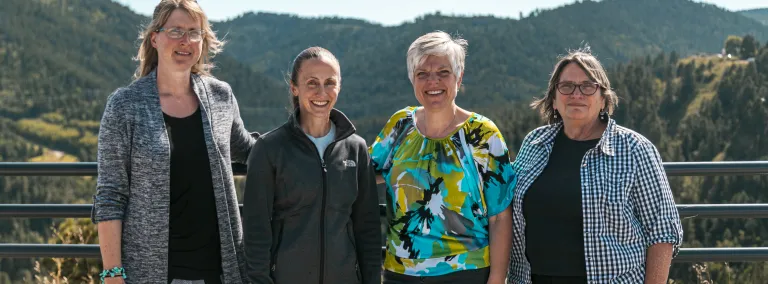EPSCoR grant fuels science education in SD
Education and Outreach team’s work will be utilized as a statewide model
The Education and Outreach (E&O) team at Sanford Underground Research Facility (Sanford Lab) knows an awful lot about how to distill esoteric scientific ideas for K-12 learners. They are also experts at providing professional development opportunities for South Dakota educators. Starting in 2020, their work in science education and workforce development will serve as a statewide model.
In September, the National Science Foundation (NSF) awarded a five-year $20 million grant to the South Dakota Established Program to Stimulate Competitive Research (SD EPSCoR) and the South Dakota Board of Regents. The project, titled “Beyond the 2020 Vision: Building Research, Education and Innovation Partnerships for South Dakota,” will not only advance the study of biofilms in the state, but also spur the development of statewide science education and workforce development infrastructure.
As part of the grant, teacher workshops will be conducted at six locations throughout South Dakota each summer with a goal to support hundreds of K-12 teachers in providing tens of thousands of students with engaging hands-on science experiences over the next five years.
“Sanford Lab’s E&O team will develop the model for teacher professional development and the curriculum modules. This team has proven experience developing high-quality training and materials. Our goal is to take the model they’ve used and apply it to the science of biofilms to connect the education component to the research this grant supports,” said Dr. Ben Sayler, Director of the Center for the Advancement of Math and Science Education and professor of physical science and mathematics at Black Hills State University. Sayler will lead the STEM education activities involving all partner institutions to develop new STEM curriculum modules and train K-12 teachers to implement the modules.
Deb Wolf, E&O director, says the three-day professional development courses will focus on how to achieve South Dakota science standards in the classroom by leveraging natural phenomena that inspire student curiosity. With six courses held in various locations across the state annually, the program will reach 180 educators each year for five years.
“Our team is purposefully choosing to host these trainings in rural locations,” Wolf said. “When you live in a remote area, your opportunities to come together as professionals are fairly limited. We want to make it as convenient as possible for a community of educators to come together and build collective efficacy. I think that’s really powerful.”
The workshops will also demonstrate how Sanford Lab’s E&O team has leveraged the science taking place at Sanford Lab to create curriculum modules. These modules, which include all the tools a teacher needs for 5-20 hours of instruction, will serve as a model for teams creating new educational resources linked to EPSCoR-funded biofilm research.
“By integrating biofilm research into our educational resources, we can show students that scientific research with meaningful applications is happening in our state and that they can be a part of it,” Sayler said.
“For our team, playing this role in the program means that our work has been well-received in the state of South Dakota and, more importantly, is effective at supporting our fantastic educators,” Wolf said.
About SD EPSCoR:
EPSCoR was started by the NSF to enhance research competitiveness by strengthening STEM capacity and capability. SD EPSCoR helps build partnerships between K-12, higher education, state government, and the private sector to enrich research, education, and economic development throughout South Dakota. SD EPSCoR is supported by NSF/EPSCoR Award OIA-1849206 and by the State of South Dakota.
